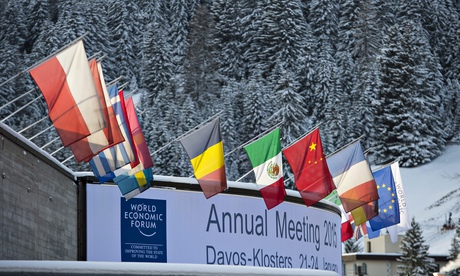
Trade union leaders have called for a new Magna Carta to tackle inequality and unemployment as they marked the start of the World Economic Forum with an urgent call for businesses to prevent social unrest by sharing the fruits of growth with employees.
On the first full day of the WEF’s annual meeting in Davos, leading labour voices said the 800th anniversary of King John’s concessions in 1215 should be marked by a new charter of rights for workers.
Philip Jennings, general secretary of UNI Global Union, which has 20 million members, said: “Politicians and business leaders at Davos are sitting on a volcano of legitimate discontent fuelled by unemployment, inequality and austerity. Collectively we have a responsibility to face up to the need to change course.
“‘Keeping Calm and Carrying On’ is no answer to the urgency and anxiety of the times. The labour movement has constructive solutions to offer: A future built on a living wage, decent jobs and collective bargaining where workers have a seat at the table.”
Jennings was backed by Frances O’Grady, the TUC’s general secretary, as he warned that the world was being transformed by the “insatiable greed” of the richest 1%. An Oxfam report this week said by 2016, the 1% best-off people in the world would own more wealth than the other 99%.
Noting that there had been an upsurge of unrest across the globe as people took to the streets to demonstrate against inequality and attacks on democracy, Jennings said: “ They are right to protest.
“This year at Davos we will celebrate the 800th anniversary of the Magna Carta, a cornerstone of modern democracy.
“We should not forget that democracy has been hard-won and we should not let it leak away by continuing down the path of inequality for the benefit of a handful of multibillionaires. We need a new ‘Including You’ Magna Carta to address the urgency of our times. A Magna Carta for equality, jobs and sustainable growth. ‘We the People’ have spoken and Davos must listen and act.”
Trade unions have played an increasingly influential role at Davos in recent years, as concerns have grown over stagnating living standards and the growing divide between rich and poor. Policymakers, including Mark Carney, governor of the Bank of England, and Christine Lagarde, managing director of the IMF, have stressed that inequality will damage growth if left unchecked.
New research from the International Trade Unions Confederation shows that in a poll of 14 countries, only 50% of those questioned thought the next generation would find a decent job, 78% thought the economic system was biased in favour of the wealthy, and 62% wanted corporate power to be tamed.
Sharan Burrow, the ITUC’s general secretary, said: “Today’s business model is bad for people, bad for the economy and bad for stability and democracy.”
O’Grady said: “Just 1% of the global population owns half the world’s wealth, so we need some voices at Davos to speak up for the other 99%. That’s why I’m here as part of a delegation of international trade union leaders. If Davos is a closed shop for the wealthy and powerful elites who caused today’s global inequality, it won’t come up with the answers needed for a more fair and prosperous future for all the world’s workers and their families.
“We need to get living wages and the protection of public services onto the agenda. And we need the business leaders attending to commit to cleaning up supply chains, paying their taxes and investing in decent jobs instead of the casino capitalism that caused the crash.”

